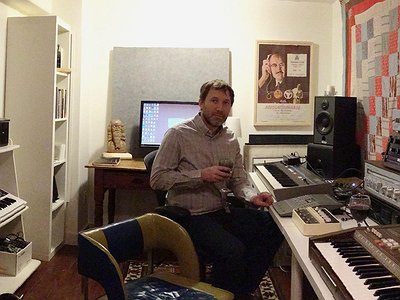Part 2
From symphonies and traditional verse/chorus-songs to linear techno tracks and free jazz, there are a myriad of ways to structure a piece of music. Which approaches work best for you – and why?
I’ve learned over time that if it’s going to work, it has to start with improvisation or ‘play.’ Any other approach inevitably leads to boredom on my part and on the part of the listener. Our brains are always pushing us towards ideas and solutions that we already know, so you have to find ways of tricking yourself into inhabiting new situations. A strategy that sometimes works for me as a last resort is to tell myself that I’m making music for little kids, and that it therefore has to be light and playful and not take itself too seriously. When it works, this short circuits the hyper-aware critical voice in my head just long enough for me to get something down. Tracks like ‘Treemotion’ and ‘See How Far’ began like this.
Could you describe your creative process on the basis of one of your pieces, live performances or albums that's particularly dear to you, please?
There’s a track on the new album called ‘Mist’ that had a weird start. In the winter of 2021 my wife Lorna and I enacted a series of exercises from a book published in 1975 by Brian Dennis called ‘Projects In Sound.’ It was basically a book of experimental music projects for primary schools, and it was filled with very interesting graphic scores designed to help kids explore the world of sound and music outside of a traditional framework. Each night we would choose a new piece, spend about twenty minutes making sure we understood its instructions, then hit record on a reel-to-reel and ‘perform’ the piece. Some were completed in one take.
Others took multiple overdubs to include everything that was called for in the text. There were several exercises based around the elements (rain, thunder, snow) and one of them called for multiple voices to repeat the word ‘mist’ numerous times in different pitches and at random intervals. It took several overdubs but we eventually managed to accumulate the number of voices required. Listening back, the piece was fairly static, but the sound of our combined voices was mildly hypnotic, and I made a mental note to see if I couldn’t incorporate it into something Mount Maxwell-related further down the road. When I dug the recording out in 2023 I could immediately ‘hear’ an underlying melody in the overtones of the voices. I quickly recorded this melody on electric piano, then began layering the voices on top. By shifting the location and pitch of the voices at specific points, something started to emerge that sounded nothing like the original exercise, and was closer to a kind of romantic or devotional music. I deliberately chose to prolong the introduction of the voices until the halfway point of the track, and their arrival is, I think, my favorite moment on the album.
Sometimes, science and art converge in unexpected ways. Do you conduct “experiments” or make use of scientific insights when you're making music?
I love experimenting (see above), but there’s rarely any science in it. It’s just another form of play.
How does the way you make music reflect the way you live your life? Can we learn lessons about life by understanding music on a deeper level?
I don’t think we learn much about life from understanding or appreciating music, but I do think that the more we understand and reflect upon life the more we’re able to understand and be open to new possibilities in music. The music I make reflects some very basic aspects of my personal existence; a love of nature and animals, a nostalgia for the areas of coastal British Columbia I was raised in, and an ongoing fascination with how sound relates to human emotion. I also recently became a dad, which is a whole other form of inspiration that I’m not even close to having words or music for.
Do you feel as though writing or performing a piece of music is inherently different from something like making a great cup of coffee? What do you express through music that you couldn't or wouldn't in more 'mundane' tasks?
Emotion, vulnerability, empathy, solidarity, the scale of one’s love for things.
Every time I listen to "Albedo 0.39" by Vangelis, I choke up. But the lyrics are made up of nothing but numbers and values. Do you, too, have a song or piece of music that affects you in a way that you can't explain?
So many. ‘Sleeping Beauty’ by Sun Ra, ‘Rivers of Babylon’ by the Melodians, ‘Job’s Tears’ by The Incredible String Band, ‘I Hear You Calling’ by Bill Fay, ‘Threnody’ by Myriam Gendron, ‘Welcome’ by Harmonia & Eno, ‘Garbagemx’ by Autechre, ‘Ending’ by Bruce Langhorne, ‘Lucky Strikes and Liquid Gold’ by Jeff Cowell, ‘Whitewater’ by Boards of Canada, ‘Last Kind Words’ by Geeshie Wiley, ‘Cortez The Killer (live)’ by Neil Young, ‘I’m Not In Love’ by 10CC, ‘Prospectors Arrive’ by Jonny Greenwood, ‘Boy About Ten’ by Harold Budd, ‘Tomorrow Never Knows’ by The Beatles, ‘High On A Rocky Ledge’ by Moondog, and on and on and on. There’s also at least three songs by Joni Mitchell that I literally cannot listen to in the company of others without completely embarrassing myself.
If you could make a wish for the future – what are developments in music you would like to see and hear?
In terms of popular music, just some kind of release from the stranglehold of corporate bullshit. In terms of electronic music, more curiosity on the part of its practitioners for stuff that falls outside the confines of their chosen micro-genres. For me personally, just to continue communicating as best I can.





